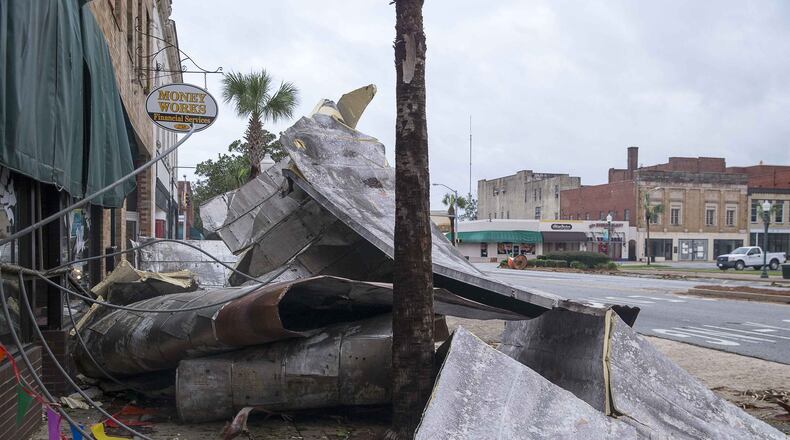Georgia’s two U.S. senators announced plans to introduce a separate disaster relief package for farmers in Georgia devastated by Hurricane Michael after a compromise spending plan to avoid another federal government shutdown left out any emergency money for recovery efforts.
The federal inaction, which left Georgia lawmakers seething, triggered a demand by Gov. Brian Kemp and other state leaders for Congress to finance aid that's stalled for months amid infighting over President Donald Trump's border wall.
In a letter sent Friday to each member of the Georgia congressional delegation, Kemp and Agriculture Commissioner Gary Black said the delay "confounds our understanding" and plunges farmers into more uncertainty as another planting season approaches.
"We ask that you utilize every sphere of influence, expand every previous limit of compromise, and exhaust every pathway of negotiation to ensure swift fulfillment of the promises made to — and heard by — our producers and rural communities," states the letter, which includes 33 pages of signatures from politicians, farmers and local elected officials.
Shortly after it was sent, Republican U.S. Sens. Johnny Isakson and David Perdue unveiled a measure to provide funding for farmers in Georgia and other states recovering from Hurricane Michael — and pointedly warned that Georgia’s agricultural heartland is in a crisis that could spiral.
“Enough is enough. Georgia and other states across the country are hurting from historic hurricanes and devastating wildfires, and the federal government continues to drag its feet,” said Perdue, a member of the Senate Agriculture Committee.
The October hurricane caused generational damage to farming communities across South Georgia, and estimates project the damage could exceed $3 billion. Trump and Vice President Mike Pence toured the area after the storm, promising federal aid.
Georgia lawmakers tried to attach emergency money to key legislation in the final days of 2018, but the showdown over the shutdown stalled the legislation. Despite assurances otherwise, negotiators wound up punting on the disaster money in the latest spending bill due to an impasse over Puerto Rico disaster funding, infuriating South Georgia lawmakers.
"To say I'm frustrated is an understatement," said U.S. Rep. Austin Scott, R-Tifton.
The Federal Emergency Management Agency has handled immediate cleanup needs following Hurricane Michael, and the state has also stepped up its aid. The General Assembly, during a special legislative session in November, appropriated $270 million for hurricane relief and $200 million in income tax credits to timber and pecan farmers for replanting trees.
And state legislators are considering taking further action, including a measure that would exempt federal hurricane recovery money from state income taxes — if or when it arrives.
“Through tax credits, short-term financing and direct assistance for forest debris removal, the state of Georgia has responded to needs in an unprecedented way,” the letter states, adding: “Yet, far too many farm families face heightened uncertainty approaching this planting season.”
WHY IT MATTERS
At $73.3 billion, agriculture is Georgia’s largest industry. Hurricane Michael caused generational damage to farming communities across South Georgia, and estimates project the damage could exceed $3 billion.
About the Author
Keep Reading
The Latest
Featured




